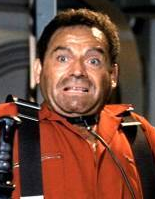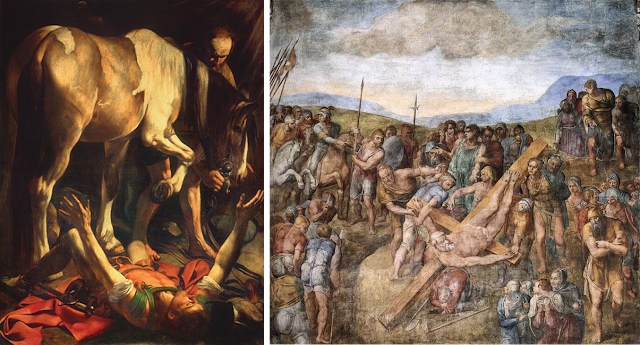I had a mildly interesting experience the other night; call it a kind of epiphany, if that isn't too heavy a word to use. We were watching Jericho, the 1966-67 World War II espionage series that ran for 16 episodes on CBS*, and could be combined as a kind of cross between Mission: Impossible and Hogan's Heroes. In this particular episode, the team—code name Jericho, hence the title—is attempting to retrieve an SS safe that contains the names of leaders of the French Resistance.
*One of the reasons you might not be familiar with it is that it ran opposite Batman on ABC and Daniel Boone on NBC.
For reasons that aren't important right now (and might not have been that important to begin with), conventional safecracking methods aren't an option. Fortunately, however, the resistance just happens to have a duplicate safe, one which they procured during a previous mission. And so, if you can't break into a safe, our heroes decide to do the next best thing: steal it, and replace it with the duplicate. This involves hauling the duplicate safe to the top of a building across the street from where the safe with the list is located, transporting it across the street via a pully, lowering down to where it can be brought in through an open window (well, at least it was open after one of the Jericho members was done with it), and switching it with the safe belonging to the SS, which is then removed from the building and brought back to resistance headquarters via the same procedure in reverse. (Where are Barney and Willy when you need them?) Got all that?
Now, the men of Jericho have to be careful in pulling off a safe transfer of the safes (so to speak); they can't afford to make any noise, so as not to alert the SS officer in the other room. (The Rat Patrol's Hans Gudegast, whom I swear must have played a Nazi officer in every World War II TV drama that's ever been made before he changed his name to Eric Braedon and became a soap opera idol.) But it turns out that the wheels on the bottom of the safe squeak, which means it has to be placed on its side on an Oriental rug and dragged across the floor to the window, and then the duplicate safe dragged back in its place.
It's a surprisingly tense scene, even though we know that Jericho, by virtue of being the good guys, is contractually bound to succeed. At one point, as the safe is being pushed into place, it bumps against the wall—and Gudegast's reaction tells you he hears it and almost decides to investigate, but dismisses the noise. And as I watched, I found myself unusually caught up in the drama. I was leaning forward on the couch, my muscles tensed; I might have even been holding my breath.
But why should I have felt that way? The outcome of this audacious move wasn't really in any doubt. Had the scene come earlier in the episode, when there was a time for a backup plan to be attempted in case this one failed, there might have been cause for concern. But for an experienced television viewer who knows about things like running times and four-act structures, there was no reason to be worried; there wasn't really enough time to try anything else. Oh, it could have ended in a wild shootout, I suppose, but that isn't really how Jericho operates, and it would have been kind of a letdown.
I found myself pondering this after the episode had concluded—and, I should stress, the scene was suspenseful enough that this thought didn't interrupt me as I was watching. But as I considered the reason, I thought back to a concept I've written about before: that of false jeopardy, the idea of putting one or more of the main characters in a situation, the outcome of which is predetermined by their status as a series regular. If the show's namesake, for example, is on trial for murder, suffers from a potentially fatal illness, or is being held hostage, you know everything's going to turn out all right in the end, unless you've got reason to believe there are some nasty contract negotiations going on behind the scenes. The only valid suspense involves how the situation is going to resolve itself. It's an awful premise around which to shape an episode.
 |
| Will the men of Jericho get out of this safe-ly? |
But then, Mission: Impossible was an exceptionally well-written and acted series, with plots that were intricately detailed down to the nth degree and that revealed themselves only a bit at a time, so that while you knew the mission would succeed, you weren't at all sure just how it would happen. Most series aren't like that; Jericho, for instance. It had the potential to be entertaining, and the best episodes were legitimately exciting. However, it had neither the consistency nor the talent (on either side of the camera) to reassure the viewer that each week's adventure could succeed on its own merits, without suffering one of those "Oh, come on!" moments that requires said viewer to suspend disbelief beyond a certain point.
Which brings us back to Jericho. In thinking about it, I realized that, for me at least, the tension arising from the scene was not so much about the outcome; rather, what was keeping me in suspense was whether or not the scene would pivot around something stupid happening, something so wildly implausible and illogical that I'd have to believe either the Nazi officers involved were among the most inept any military had ever seen—men who would put Sergeant Shultz to shame—or that the agents of Jericho were luckier than anyone who'd ever gotten rich playing the slots in Vegas. I think you know the kind of thing I'm talking about here; it's something that's so distracting, so beyond the realm, that it brings the entire scene to a standstill, and causes you to wonder it, perhaps, you might have a future in scriptwriting if this is the best that Hollywood has to offer.
The good news is that this episode of Jericho passed the test. Oh, the boundaries were pushed a little; the reason Gudegast doesn't go to investigate the noise he hears is that his secretary (a Belgian national who's actually a member of the resistance, with her name on that list inside the safe, and is working with Jericho) is supposed to be in the room putting on some jewelry that Gudegast has given her in an attempt at seduction, so of course a gentleman wouldn't go barging in on her at a time like that. A little weak, perhaps, but we'll give it it a pass since this part of the storyline was introduced organically and had been present from the beginning, as opposed to being dumped on us all of a sudden.
(I did wonder why none of the German soldiers guarding the building noticed a safe being pulled back-and-forth on a rope over their heads, but this was all happening at night, and I suppose it isn't exactly the kind of thing you steel yourself to be on the lookout for when you go on duty that night. Besides, you'd expect this part of the plan to be implausible, and you'd be right.)
My question to you is this: how many times have you experienced something similar, during a show you were enjoying, when you discovered that the only reason you were holding your breath was not because of the innate tension of the scene, but because you were worried that the writers or the director might ruin the moment with something stupid? Now that I think about it, it's happened to me more than a few times, and it's always a disappointment. Maybe I'm too demanding when it comes to plausibility (Maybe? you say), but this issue of false jeopardy, or whatever you want to call it, is something real, something that can diminish the quality of a episode or cheapen the suspense it's trying to generate. In this case, Jericho was able to pull it off. I wish I could say that more often about more programs. TV

















